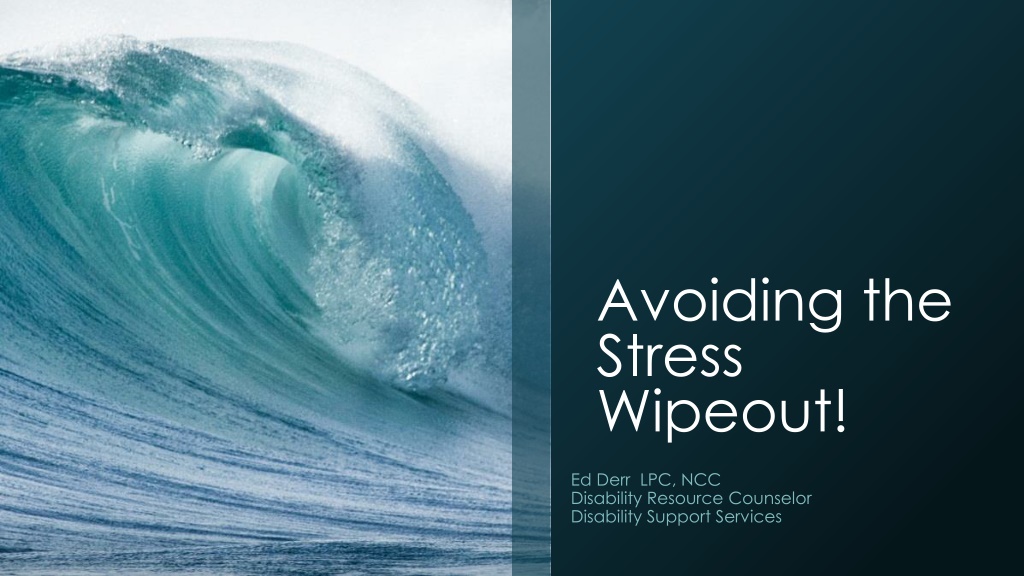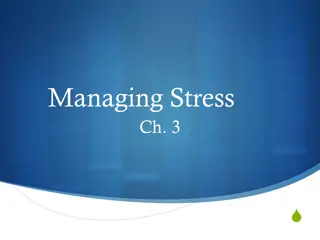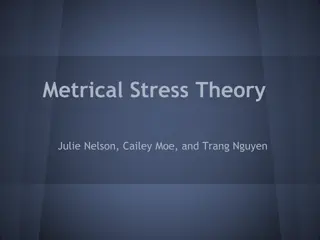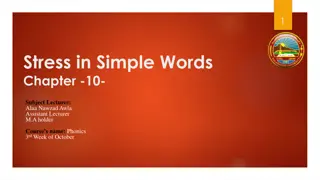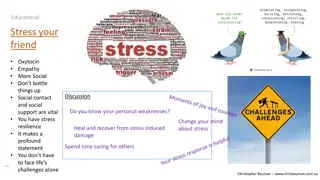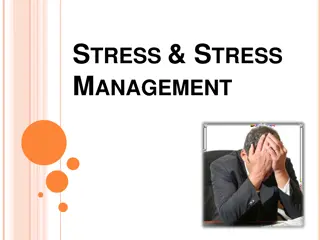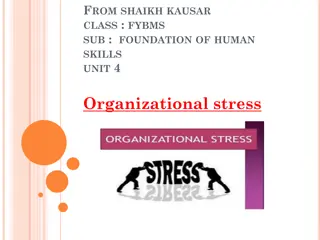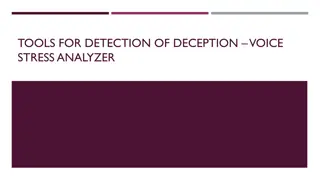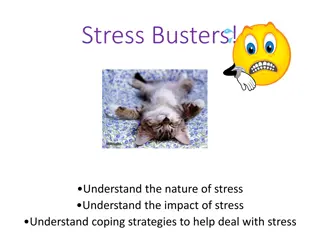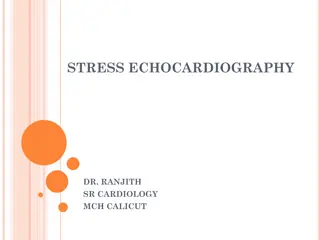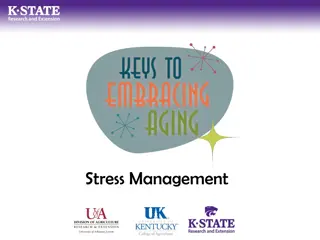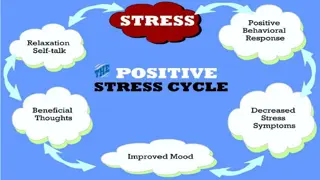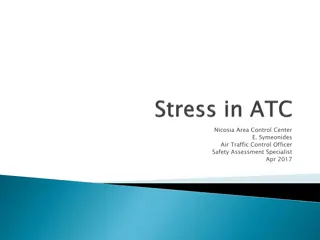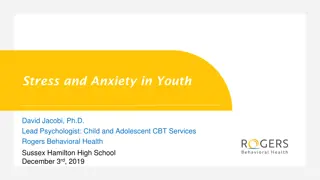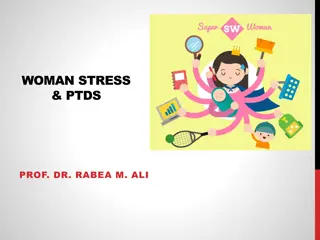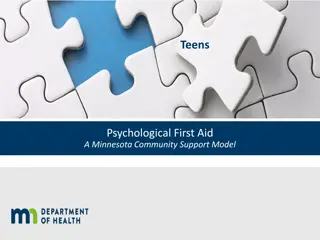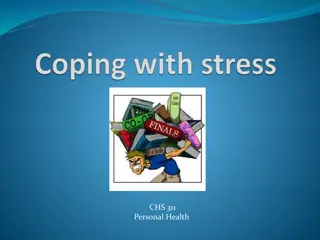Understanding Stress: Good vs. Bad, Benefits, and Risks
Stress is a natural part of life, with both positive and negative effects. Good stress can be motivating and boost memory, while bad stress can have detrimental impacts on physical and emotional health. Recognizing the differences between them is crucial for managing stress effectively and maintaining overall well-being.
Download Presentation

Please find below an Image/Link to download the presentation.
The content on the website is provided AS IS for your information and personal use only. It may not be sold, licensed, or shared on other websites without obtaining consent from the author. Download presentation by click this link. If you encounter any issues during the download, it is possible that the publisher has removed the file from their server.
E N D
Presentation Transcript
Avoiding the Stress Wipeout! Ed Derr LPC, NCC Disability Resource Counselor Disability Support Services
Good vs. Bad Stress Rarely do we hear people say, I m really feeling stressed. Isn t that great! We need stress in our lives to give us direction and happiness, to keep us healthy Is there such a thing as Good Stress ? Managing stress a lot like surfing stay on top, in control! Overwhelming stress makes good energy turn into bad
Good Stress The type of stress we feel when we feel excited. Our pulse quickens and our hormones surge, but there is no threat or fear. Good stress can help us meet daily challenges and motivates us to reach our goals. Help us accomplish tasks more efficiently. It can even help boost memory. Helps us to feel good about our lives! i.e., roller coaster rides, first dates, promotions, the big one that didn t get away, etc.
Benefits of Stress Stress is also a vital warning system that produces the fight- or-flight response When the brain perceives some kind of stress, it starts to flood the body with chemicals and hormones, creates a variety of reactions such as an increase in blood pressure and heart rate Our senses suddenly have great focus so you can avoid physically stressful situations like jumping away from a moving car Researchers believe some stress can help our immune system, how our hearts work, protections from infection, promote recovery from surgery
Bad Stress Stress is key to survival but too much can be detrimental Acute stress comes from quick surprises that need a response Acute stress triggers the body s stress response but the triggers aren t always happy and exciting. This kind of stress doesn t take a heavy toll on us if we find ways to relax, allow our body to return to its pre-stress state to be healthy and happy.
Chronic Bad Stress Chronic stress is more bad stress! It occurs when we repeatedly deal with stressors that take a heavy toll a stressful job or unhappy home life can bring/maintain this kind of serious stress Because our bodies aren t designed for chronic stress, we can face negative physical and emotional health effects if we deal with chronic stress for an extended period of time (high blood pressure, hypertension, heart disease, weight gain or loss, head aches, fatigue, depression, anxiety, others)
Signals of Too Much Stress Inability to concentrate or complete tasks Get sick more often with colds or flu Body aches Headaches Irritability Sleep problems troubles falling asleep or staying awake Changes in appetite More angry or anxious than usual
Healthy Balance Overall, its important to have good stress in your life Make an effort to cut out as much chronic stress as possible Change your perception of stress where you can, add positive activities and coping strategies to promote good stress
Take Care of Yourself The critical self-care activities are: Sleep hygiene targeted bedtimes, wake times, get enough good sleep Physical exercise plan to get a least 1hr/day Healthy diet curb sugars, caffeine, drink water! Support system Limit time on social media, screens Embrace your spirituality and/or religious community Maintaining a sense of normality and routine can reduce stress (routines create a sense of structure, safety, control) Breathing exercises, journaling, meditation, visualization schedule a relaxation break every day!
Watch out for signs of stress overload symptoms can be physical, emotional, mental and behavioral Know your stress triggers stress and its triggers are different for everyone. Certain people, places or situations might produce high levels of stress. Think about what causes you stress and brainstorm solutions Manage your time well, prioritize tasks, write things down on a calendar or task management app Don t self-medicate drinking alcohol excessively, recreational drugs can negatively affect mood and health
Find Things to Do/Distractions Activities that distract you from current events or work stress can be helpful: Household chores can give you a sense of purpose, accomplishment Hobbies and interests Reading . Lose Yourself in a book (an author you like or a topic you find interesting) TV, movies, streaming Volunteering The helper principle shows that helping others is also a benefit to the helper. Find a cause important to you to help make a difference
Taking Care of Your Mental Health in the Face of Uncertainty Human beings like certainty! We are programmed to want to know what is happening when. We are also wired to notice things that feel threatening to us. When things feel uncertain or unsafe, its normal to feel stressed. While this reaction is in us to protect us, it can also cause a lot of stress and anxiety. A large part of anxiety comes from feeling like we should be able to control things that we can t! The Coronavirus has really challenged us. In times like these, our mental health can suffer. We don t always know its suffering. Feeling angry, helpless, sad?
What are the Mental Health Implications from COVID-19? A working knowledge of different mental health implications can help us understand and address mental health risks of coronavirus: Anxiety related to the coronavirus is to be expected. Key worries are: You or someone in your family will get sick Your investments, such as retirement, savings, financial status will be negatively impacted You will lose income due to a workplace closure or layoff You will put yourself or someone you love at risk of exposure to the virus if you believe you can t afford to stay home and miss work
Obsessions For those with OCD, it is easy to become obsessive about disease prevention unwanted, intrusive worry that one is dirty and in need of washing, cleaning, or sterilizing . Loneliness Social distancing is critical to slowing the spread of the virus. However, it can understandably lead to loneliness. Many studies have shown the negative mental health and physical impacts of loneliness. Traumatic Stress, substance abuse, domestic violence, depression
What Can I Do? Be Mindful of Your News Consumption Limit your sources rely on only 1 or 2 reliable sources of news Practice acceptance accept that the news coverage will not answer all your questions or calm all your worries. Trust that people are doing their best. Limit consumption establish a reasonable rate of consumption, consume only what you need to know. Distinguish between global and local the virus will not necessarily affect us in SWMO as it has in other places, however there is a need to be vigilant. Stay connected with family and friends. It s important to warding off loneliness and resulting depression.
More Separate what is in your control from what is not wash your hands, physically distance Do what helps you feel a sense of safety this will be different for everyone. It s ok if you ve decided to limit your attendance at social events, wear a mask, or not to go to restaurants Get outside in nature! Fresh air, Vitamin D Challenge yourself to stay in the present when you notice you are worrying about something that hasn t happened, gently bring yourself back to the present moment. Notice sights, sounds, tastes, scents in your immediate moment and name them (mindfulness activity) Stay connected with others in some ways
Stress is an inevitable part of life, but we can improve the way we respond to stress and avoid or change some of the situations that create bad stress. Thank you for listening. Enjoy your semester!
